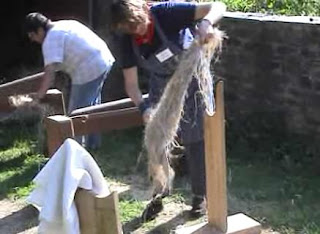This is a repost from 5 years ago. I wanted to share again because the process of creating flax linen is fascinating!
Imperial Trellis
Imperial Trellis
Why is it so expensive?!
This is Fran's shade from Green Street Blog.
When Fran contacted me about making this shade for her two years ago I had not yet heard of Imperial Trellis. She sent me the fabric and I made the shade all the while noticing how FABULOUS this fabric was to work with. It did everything I wanted it to. It was flawless. I said to myself, "I have got to find out what this amazing fabric is!" So I looked it up and was so glad she didn't tell me its list price before I made it--it would have made me a little nervous. . .
Normally when I sew a shade I first mark the measurements on it with a disappearing ink pen marking them at a 1/2" wider and longer than the given measurements because when we turn the fabric inside out after sewing the main fabric to the lining we lose some of the width and length in the seam. But with Imperial Trellis I can mark at the exact given measurements and when I turn it out it will be exactly what I measured. I have yet to find another fabric that will do that.
Mandarin
The current list price with Schumacher if you don't have an account with them is $206.00 per yard!!! Often I get people that email me from my website saying, "You have Imperial Trellis listed with a three digit number for yardage! I think there is a typo." And I say, "Nope. That's what it costs. Painful, I know."
Citrine
WHY?
First and foremost it is a matter of supply and demand. The Imperial Trellis design itself is extremely popular right now. To meet the demand they have to increase the price.
Imperial Trellis is printed on 100% flax linen. Why is that so special, I asked myself. A quick visit over to Wikipedia tells me that flax is often retrieved from the earth manually as more of the stalk can be harvested that way vs. when it is mechanically harvested.
There is a very long process the flax must go through before it is spun and made into its "thread form" for weaving into fabric. First it must be harvested.
Then it undergoes a process called "retting" where the inner part of the stalk is rotted away but the coarse outer fibers and straw (flax) are still intact.
Next, the flax is "dressed." This is the term used for the step when the flax straw is separated from the coarse fibers in what is left of the stalk.
Dressing the flax has a whole process in itself. It is difficult to do and so there are many methods to do it. You can "break" it by putting the flax stalks in a breaker machine which beats the stalks until they are soft and pliable. You can "scrutch" the flax with a scrutching knife by hanging the stalks vertically and striking the stalks with the scrutching knife causing the coarse fibers to break away from the flax straw. Or it can be "heckled." A heckle is a bed of nails that separates the flax straw from the fibers.
FINALLY, when all that is left is the straw, it is ready to be spun into linen!
Long story short (too late!) Imperial Trellis is printed on a natural fiber that undergoes a scrutinous process before it can even be spun. And that is why it is so expensive. But I will tell you from personal experience that it is so worth it. It is a fabulous product.
Java
While Shumacher has it listed at ridiculous dollars per yard, my girl Lynn Chalk has all the color ways available for $125! And, I never thought I'd say this about a triple digit number for yardage, but that's a steal!
navy
It is a very expensive fabric, but it is worth it. It is stunning to look at, has tons of fullness and adds a softness to any room. One of my favorites!!








































